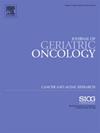The effect of comprehensive geriatric assessment on treatment decisions, supportive care received, and postoperative outcomes in older adults with cancer undergoing surgery: A systematic review
IF 2.7
3区 医学
Q3 GERIATRICS & GERONTOLOGY
引用次数: 0
Abstract
Introduction
Surgery is an essential part of cancer treatment, particularly for localised solid tumours. Geriatric assessments (GA) with tailored interventions or comprehensive GA (CGA) can identify frailty factors and needs of older adults with cancer, assisting treatment decisions and care strategies to reduce postoperative complications. This systematic review summarises the effects of GA/CGA compared to usual care for older adults with cancer intended for surgery: their impact on treatment decisions, supportive care interventions, postoperative complications, survival, and health-related quality of life (HRQOL).
Materials and Methods
We conducted a systematic search of MEDLINE, EMBASE, CINAHL, and PubMed (January 2000–October 2022) for randomised controlled trials (RCTs) or cohort studies with a comparison group on the effects of GA/CGA in older adults with cancer (≥65 years) intended for surgery. This systematic review was conducted in accordance with Preferred Reporting Items for Systematic Reviews and Meta-Analyses guidelines. Due to heterogeneity in study designs and reporting, a meta-analysis was not possible; results are narratively described.
Results
From 12,440 citations, 312 were selected for full-text review. Thirteen studies reporting on 12 trials were included for analysis: four RCTs and eight cohort studies with comparison groups (three prospective, five retrospective). RCTs ranged in sample size (122–475; mean 249), with variability in who performed GA/CGA, disciplines involved, and team integration. Primary outcomes included impact of GA/CGA on postoperative delirium (two studies), Clavien-Dindo (CD) grade II-V postoperative complications (one study), hospital length of stay (one study), and a composite criterion including mortality, functional impairment, and weight loss (one study). All RCTs scored high for risk of bias due to underpowering for their primary outcome; none met their primary endpoint. After adjustment for prespecified factors in secondary analyses, one RCT found GA/CGA significantly reduced the odds of postoperative complications (CD grade I-V) (adjusted-OR: 0.33, 95 %CI: 0.11–0.95; p = 0.05) due to fewer grade I-II complications. One RCT reported no significant difference between groups in HRQOL: intervention patients reported less pain at discharge, but this difference disappeared at three-month follow-up.
Discussion
Well-powered, high-quality trials are needed to determine the impact of GA/CGA on optimising surgical treatment decisions, supportive care and postoperative outcomes for older adults with cancer.
综合老年评估对接受手术的老年癌症患者的治疗决策、接受的支持性护理和术后结局的影响:一项系统综述
手术是癌症治疗的重要组成部分,尤其是局部实体瘤。老年评估(GA)与量身定制的干预措施或全面的GA (CGA)可以确定老年癌症患者的脆弱因素和需求,协助治疗决策和护理策略,以减少术后并发症。本系统综述总结了GA/CGA与常规护理对高龄癌症手术患者的影响:它们对治疗决策、支持性护理干预、术后并发症、生存率和健康相关生活质量(HRQOL)的影响。材料和方法我们对MEDLINE、EMBASE、CINAHL和PubMed(2000年1月- 2022年10月)进行了系统检索,检索随机对照试验(rct)或队列研究,比较GA/CGA对高龄癌症患者(≥65岁)手术的影响。本系统评价按照系统评价和荟萃分析指南的首选报告项目进行。由于研究设计和报告的异质性,不可能进行荟萃分析;结果是叙述性的。结果从12440篇文献中筛选出312篇进行全文综述。13项研究报告了12项试验纳入分析:4项随机对照试验和8项队列研究与对照组(3项前瞻性,5项回顾性)。随机对照试验的样本量范围为(122-475;平均249),在执行GA/CGA的人员、涉及的学科和团队整合方面存在差异。主要结局包括GA/CGA对术后谵妄的影响(两项研究)、Clavien-Dindo (CD) II-V级术后并发症(一项研究)、住院时间(一项研究)和包括死亡率、功能损害和体重减轻的综合标准(一项研究)。所有随机对照试验均因其主要结局不足而获得高偏倚风险评分;没有人达到主要终点。在二级分析中调整预先指定的因素后,一项RCT发现GA/CGA显著降低了术后并发症的发生率(CD等级I-V)(调整or: 0.33, 95% CI: 0.11-0.95;p = 0.05),因为I-II级并发症较少。一项随机对照试验报告各组间HRQOL无显著差异:干预组患者出院时疼痛减轻,但3个月随访后这种差异消失。需要高质量的试验来确定GA/CGA对老年癌症患者优化手术治疗决策、支持性护理和术后结果的影响。
本文章由计算机程序翻译,如有差异,请以英文原文为准。
求助全文
约1分钟内获得全文
求助全文
来源期刊

Journal of geriatric oncology
ONCOLOGY-GERIATRICS & GERONTOLOGY
CiteScore
5.30
自引率
10.00%
发文量
379
审稿时长
80 days
期刊介绍:
The Journal of Geriatric Oncology is an international, multidisciplinary journal which is focused on advancing research in the treatment and survivorship issues of older adults with cancer, as well as literature relevant to education and policy development in geriatric oncology.
The journal welcomes the submission of manuscripts in the following categories:
• Original research articles
• Review articles
• Clinical trials
• Education and training articles
• Short communications
• Perspectives
• Meeting reports
• Letters to the Editor.
 求助内容:
求助内容: 应助结果提醒方式:
应助结果提醒方式:


